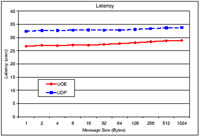A Case for UDP Offload Engines in LambdaGrids
February 2nd, 2006
Categories: Networking, Software

Authors
Vishwanath, V., Balaji, P., Feng, W., Leigh, J., Panda, D.K.About
Though TCP / IP is considered the de facto standard for Internet related wide area computing, its failure for LambdaGrids is well documented. On the other hand, rate-controlled UDP / IP-based protocols are strongly emerging as a feasible solution for meeting the performance goals in such environments. While such protocols have been able to avoid most the drawbacks of TCP / IP, they are still plagued by the drawbacks of UDP / IP, such as a host-based implementation, limiting their performance on high-speed networks. On the other hand, researchers have attempted to fix this drawback in TCP / IP using hardware offloaded TCP / IP implementations such as the TCP Offload Engines (TOEs). Given these two orthogonal developments, it is not completely clear about which is a better solution, i.e., a rate-controlled UDP / IP based protocol that is implemented in the host or a hardware offloaded TCP / IP solution such as the TOE. In this paper, we combine the benefits of both these solutions to design and develop an emulated UDP Offload Engine (UOE) based on the Chelsio T110 TOE; a solution which would transparently improve the performance for existing UDP / IP-based applications. Evaluations of our emulated UOE stack show that our design can achieve up to a 35% improvement in the performance while maintaining a significantly lower CPU usage.
Keywords: LambdaGrid, UDP, TOE, Sockets
Resources
Citation
Vishwanath, V., Balaji, P., Feng, W., Leigh, J., Panda, D.K., A Case for UDP Offload Engines in LambdaGrids, Proceedings of The Fourth International Workshop on Protocols for Fast Long-Distance Networks (PFLDnet 2006), Nara, Japan, February 2nd, 2006.